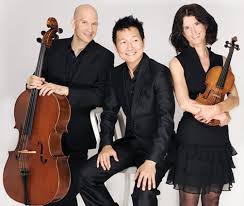A sensational performance of personality and vocal
power
Presented by Evenko
May 28th,2014
Salle Wilfred-Pelletier in Place des Arts was packed with
adoring Il Divo fans and first-timers about to fall under the magic of this
charismatic group. People of all ages were there. Such is the timeless appeal
these four fabulous singers have – ever since they joined forces to form Il
Divo when music producer Simon Cowell first discovered the ‘power of
four’. Fast forward ten years into 33
countries and four world tours during which the dynamic Il Divo established
their god-like stature, sweeping audiences off their feet while making
classical cross-over-music history. The foursome has sold over 26 million
albums and received 160 gold and platinum awards.
Indeed, their confidence,
showmanship and connection to the audience was obvious during this May 28th Montreal tour-de-force
performance.
The show’s fitting title, A
Musical Affair: The Greatest Songs of Broadway
featured popular songs from their sixth and latest album, A Musical Affair.The live
18-member orchestra opened up the show with an instrumental medley of our song
favourites from musicals, including Evita,
Phantom of the Opera, Cats, West Side Story, Les Misérables and more. And then the
spell began: Il Divo’s four dashing figures made their entrance. Smoke slowly
swirled from the stage floor, and as their faces came into view, applause
thundered and voices roared from the hall’s 2,982 seats.
Their powerful voices blended into rich harmonies no matter the register
and tonal challenges within the great variety of song melodies. Whether performing
such big numbers as Climb Every Mountain
or delivering such heart-wrenching numbers as Some Enchanted Evening, If
ever I should love You, and Tonight.
These romantic songs showed off the tenderness and the restraint each of these
classically trained singers possess. Interestingly, each has his own distinct
sound and background. The most opera-sounding voices came from Spanish
baritone, Carlos Marín and American tenor, David Miller. Their lush tones
melded richly with the pop genre tones of France’s
Sébastien Izambard and with former rocker heartthrob, Urs Bühler from Switzerland.
Together, the four created a varied vocal fest of sensual expressive
brilliance. The volume and range each one displayed was rather mesmerizing, and
the arrangements perfect – some parts of song strategically parceled off to the
most appropriate voice for that passage in the song. In fact, I would have
liked to have heard full length solos from each of them, but each song
inevitably brought all four together in most moments of the song and always on
the last line. I can’t forget how they ended Somewhere from West Side Story, it fluidly slid out as a piece of
vocal silk on a single soft waning note. In contrast was the booming crescendo
of such endings in I Did It My Way
and I Will Always Love You (Whitney
Houston would have been proud).
Glitzy guest diva Lea Salanga, added yet another exotic element. An
acclaimed Filipina singer and actress whose multiple awards are as impressive
as her lead roles: Kim (Miss Saigon),
Jasmine (Disney’s Alladin), and
Éponine and Fantine (Les Misérables)
– excerpts from the latter two performed during this performance along
with the song Defying Gravity from (Wicked).
She really belongs on that stage; she immediately captivated us with her
intensity and beauty. When she sang I
dreamed a Dream, you could hear a pin drop; we felt her emotional anguish.
That mood completely lightened when the fellows joined her vying for her
attention in the song If Ever I Would Leave You (Camelot)
Indeed, the evening was not without jokes – often made at each others’
expense, such as when Carlos talked about his love and prowess with women; in
fact, this boasting would have gone on and on had not one of the guys handed
him a small container of those notorious “little blue pills”. That got a big
laugh.
Self-deprecating humour about how poorly they spoke French came from Mr.
Miller and Mr. Marín, but when the group polished off Céline Dion’s upbeat song, Que Tu M’Aimes Encore, their accents
and diction were impeccable. The crowd went crazy cheering, standing on their
feet, singing along and clapping the beat.
Projected images on the back wall and effective spotlighting enhanced
the show’s presentation. But it was the guys who really stole the stage. Three
encores and non-stop clapping continued for about ten minutes after it all
ended with the parting song delivered in Italian and English Time to Say Goodbye.















